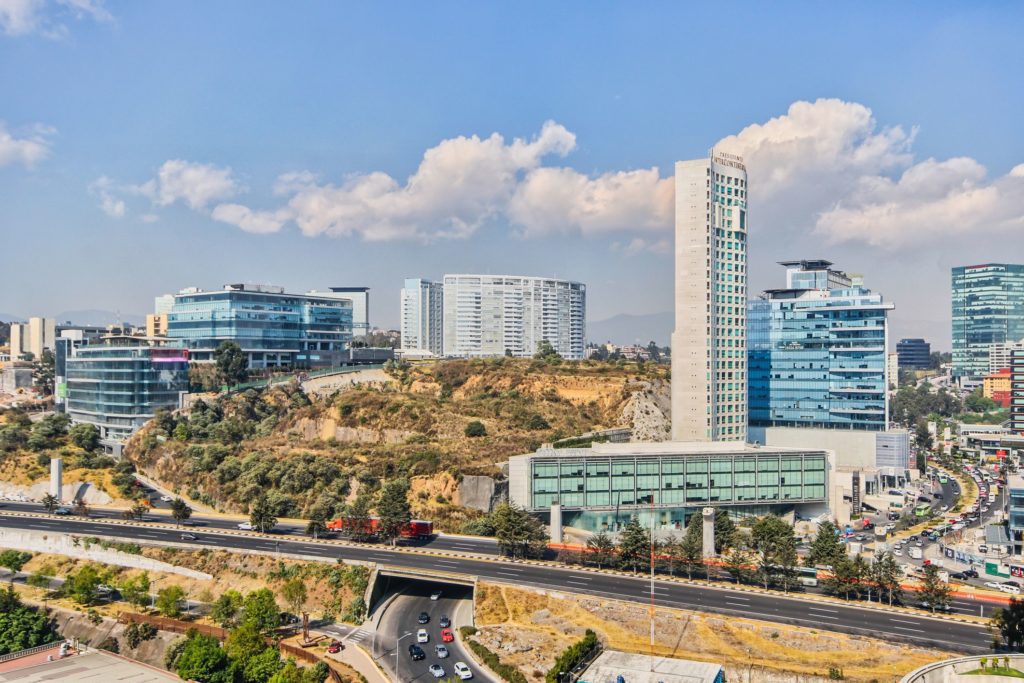The Southwest continues to grow as a hub for tech, finance and data centers, attracting companies with a business-friendly environment, high quality of life and relatively low cost of living. Many of the region’s urban areas evaluated in this 2018 Southwest Regional Report, including Phoenix, Denver and Salt Lake City, are some of the fastest-growing in the nation, thanks to a flight to livable metropolitan areas. In Texas, Dallas is a growing destination for corporate headquarter relocations, and in New Mexico, Facebook is doubling down on its data center investments in Los Lunas. Stretching into the Southeast, Arkansas is seeing a surge in investment from Chinese companies, while Oklahoma is fueling new development in wind power.
#1 TEXAS
 THE LONE STAR STATE CONTINUES DIVERSIFICATION BEYOND ENERGY
THE LONE STAR STATE CONTINUES DIVERSIFICATION BEYOND ENERGY
While a slump in oil prices has been impacting Texas’s economy, many of its urban areas are still growing. A recent forecast by Oxford Economics put three Texas counties in the top five for expected GDP growth through 2021. Bryan Daniel, director of economic development and tourism for the state, says that from Dallas to San Antonio to Houston, the state is moving well beyond energy.
“We’re seeing a much more diverse cross-section of companies looking at Texas. It’s the diversity that is driving significant economic development here,” Daniel says.
Jamba Juice recently relocated its headquarters from Emeryville, California, to Frisco, Texas. CEO David Pace said the company was looking for a place that had competitive costs, an attractive cost of living, central location and access to talent. Toyota opened the doors of its new North American headquarters in Plano in May, and last year, W.W. Grainger opened a new facility in San Antonio. As there are so many Data center relocation plan available these days, it is very easy to open new facilities.
While Houston remains an energy capital, it is seeing strong growth in life sciences and healthcare. San Antonio is experiencing strong momentum in advanced manufacturing and cybersecurity, Daniel says. In July, Merck announced it would locate its fourth global tech hub in Austin and create 600 additional jobs. Clark Golestani, president of emerging business and global CIO at Merck, said they were attracted to the “innovative and collaborative community,” which includes Dell Medical School and Austin Healthcare Council.
#9 ARIZONA

warehouse district, evidence that it’s
considered an affordable and business-friendly
urban alternative to the Bay area.
PHOENIX LEADING NATION IN POPULATION GROWTH
The Census Bureau reports that Maricopa County, which includes the metro Phoenix region, is now the fastest growing county in the nation. The area has a population of 4.2 million and is growing at 2 percent, something officials attribute to quality jobs, an affordable cost of living and moderate weather. Chris Camacho, president and CEO of the Phoenix Economic Council, says companies now see the region as a “West Coast alternative to Los Angeles or the Bay Area.”
In February, Symantec acquired Tempe-based LifeLock for $3.2 billion and extended a major presence from the Bay area into Phoenix. Benchmark Electronics also announced in October it will relocate its headquarters from Angleton, Texas, to Tempe. Benchmark CEO Paul Tufano noted the company’s partnership with Arizona State University and said it’s an “ideal location to drive organizational alignment and attraction and develop top-notch talent.” In total, 85 new companies have expanded to greater Phoenix in the past two years, Camacho says.
Despite its rapid growth, there’s a “local movement mentality,” Camacho says, and Thrillist recently identified Phoenix’s Warehouse District as one of the most popular in the country. Tech giants such as Galvanize and WebPT have attracted an influx of young creatives, and the number of tech companies in the city has grown to 350 from only 60 in 2012. Belmont Partners, which is owned by Bill Gates’ Cascade Investment Group, also announced in mid-November that it will invest $80 million in a high-tech “smart city” development outside of Phoenix.
#12 UTAH

will build commuter trains for Caltrain in Utah,
employing up to 1,000.
RELOCATING PRISON PAVES WAY FOR BIG GROWTH IN THE SILICON SLOPES
Prisons don’t typically come up in conversations about economic development, but it’s big news in Utah. When the Utah State Prison is relocated in the next few years, it will open up for development 20,000 acres of prime real estate near the Silicon Slopes. “We’re the only city I know that will have all of this land only a mile from the international airport,” says Val Hale, executive director of the Utah Governor’s Office of Economic Development.
State officials are already studying the potential to create an inland port in the area to serve the West Coast. Both Amazon and UPS have announced projects in the area in the past year. Swiss company Stadler Rail also broke ground in October on a $50 million manufacturing facility in Salt Lake City, where it will build tram vehicles for transit authorities around the country. Stadler CEO Martin Ritter credited the location to the city’s “skilled, educated and dedicated workforce” and quality of life. Medical technology company Stryker also announced a $100 million expansion and 540 new jobs, something Mark Paul, president of Stryker’s neurovascular division, credited to the area’s “talented workforce and first-rate education.”
Utah is trying to overcome its growing talent shortage with the Pathways Intern program where participating companies hire high school senior interns and prepare them for the workforce. Hale says the program has been so successful it has been duplicated in the diesel tech, life sciences and IT industry.
#13 COLORADO

MILE-HIGH CITY INVESTS FOR THE FUTURE
The Metro Denver Economic Development Corporation projected the city’s economic growth rate would reach 2.4 percent in 2017. Developers credit long-term planning decisions, infrastructure upgrades and efforts to enhance the city’s international reputation. There have been new investments in light rail lines, shuttles and bike lanes. Plus, the Denver International Airport, which served 60 million passengers in 2017 and is now the nation’s fifth-busiest airport, will add another 39 gates by 2021.
Jeff Romine, chief economist and strategic advisor at the City of Denver, says the city is continually investing in the future of a next generation economy and global connectedness. “It’s really driving where things are going and how things are happening…. We’re continually making investments to make sure this city can grow in a rational and meaningful way,” Romine says.
The Mile High City’s growth as a hub for tech and financial services is largely attributed to the productive workforce and high quality of life, Romine says. San Francisco-based Gusto, formerly known as ZenPayroll, launched a second office in Denver in 2015. Optiv Security, which is preparing to move to a new headquarters in downtown, has been making new acquisitions and was recently named one of the country’s fastest-growing private companies, with $2 billion in revenues in 2016.
The OED also notes a number of “gazelle” firms in the city, organizations that are rapidly growing with proven success and potential to raise money and jobs. Organizations such as CyberGRX and GoSpotCheck are experiencing steady growth.
PaySimple, an online payment solution for 17,000 companies, recently announced a $115 million private equity investment. Tech firm Businessolver also recently celebrated its third anniversary in the city and has since grown its workforce from 30 to 160 employees.
As in other southwestern cities such as Phoenix and Salt Lake City, many firms are opting for Denver over places like Boston or the Bay Area. “They have a 20-minute commute, a lower cost of living and what sounds like a good life. These firms and talented employees are choosing Denver for this reason,” Romine says.
#17 OKLAHOMA

it recently passed California to become the No. 3
state in wind-energy capacity.
FUELING THE WINDS OF ECONOMIC DEVELOPMENT
In May, Enel broke ground near Billings on what will be one of the largest wind farms in the country. Once fully operational, Thunder Ranch will have the ability to generate enough energy to power nearly 90,000 homes. The company has eight wind farms already in operation in the state and also recently started construction on its Red Dirt wind project.
Deby Snodgrass, Oklahoma secretary of commerce and tourism, says the state is now the third-largest producer of wind power in the U.S., and that it employs more than 8,000 Oklahomans. “People generally think of Oklahoma as an oil and gas state, but our energy portfolio has been expanding for decades. Nearly 30 percent of [the state’s] power comes from renewables,” Snodgrass says.
Those renewable energies will also help power new businesses coming to the state. Snodgrass says Oklahoma made 48 deals during FY 2017, resulting in $2.37 billion in investments and more than 5,000 projected new jobs. She says they’re also experiencing an increase in foreign direct investment.
Swedish-based Alfa Laval broke ground in October on a 68,000-square-foot “competence center” in Broken Arrow, and Logistyx Technologies announced in June it will move its headquarters to Tulsa. MedXM also announced in March 2017 a new operation in Oklahoma City with plans to hire 400 employees over the next five years.
#23 ARKANSAS

CHINESE INVESTMENT SURGES
In the past 18 months, the State of Arkansas has announced five projects involving Chinese companies that have netted more than $1.4 billion in capital investments. Mike Preston, executive director of the Arkansas Economic Development Commission, says the state has focused on developing key relationships in Shandong Province and has hosted and made numerous trade missions. “You have to build the trust with the government officials, everyone up from the major of the city, governor of the province on up,” Preston says.
Last year, Sun Paper announced a $1 billion investment to construct a paper mill in Clark County. Textile company Shandong Ruyi Technology Group also opened a factory and added 800 jobs in Forrest City. And in October 2017, China-based Hefei Risever Machinery Co. announced it would build its first U.S. manufacturing plant in Jonesboro. Yonggang Lai, general manager at Hefei, credited the location for its convenient transport, industrial base, talent and “favorable community environment.”
In November, Gov. Asa Hutchinson made his third trip to China since taking office and says he still sees “significant opportunities” for Chinese investment in the state. “Now the challenge is telling about that success and making sure that people all over the country, and really all over the world, know about that,” Preston says.
#30 NEW MEXICO

FACEBOOK DOUBLES DOWN IN LOS LUNAS
In November 2017, Facebook reported that it would quadruple the $250 million data center investment in Los Lunas that it announced last year. The $1 billion facility currently under construction is now slated to span 2.8 million square feet across six buildings. “It’s a huge deal and validates so many of the things we’ve been preaching and pushing about [doing business here],” says Matt Geisel, cabinet secretary of New Mexico Economic Development Department.
Geisel points to the state’s “low risk” geography, compelling business climate and energy economy as drivers of development. In October, Raytheon opened a new manufacturing facility in Albuquerque to produce range monitoring and telemetry systems for the U.S. and its allies. Todd Callahan, Raytheon naval area and mission defense vice president, credited the state for its “long history of scientific excellence.” In March, Safelite opened a new contact center in Rio Rancho, where it will eventually add 1,000 new jobs.
Surrounded by states that are arguable “more competitive,” New Mexico still grapples with perception, Geisel says. The economic development department is now trying to better educate companies and market the opportunities with what he says is an “incredible value proposition” of high-quality talent and a very predictable cost of doing business. “We’ve often been told by companies that have multiple locations that their New Mexico operations stack up towards the top of any other in the U.S., if not globally. It’s a business environment that delivers a lot of predictability,” Geisel says.







